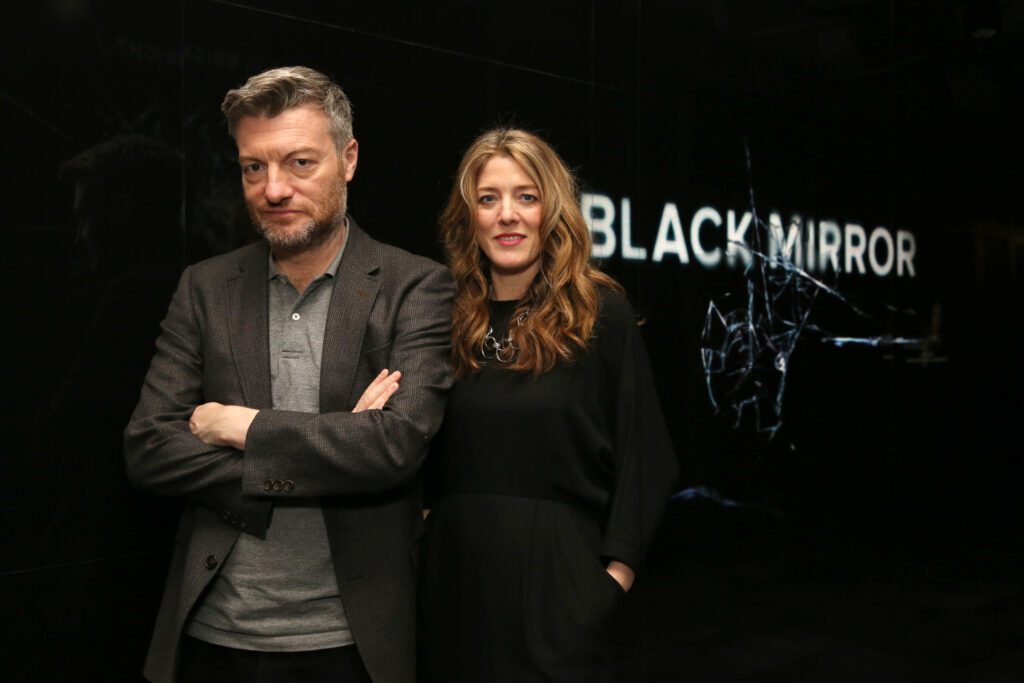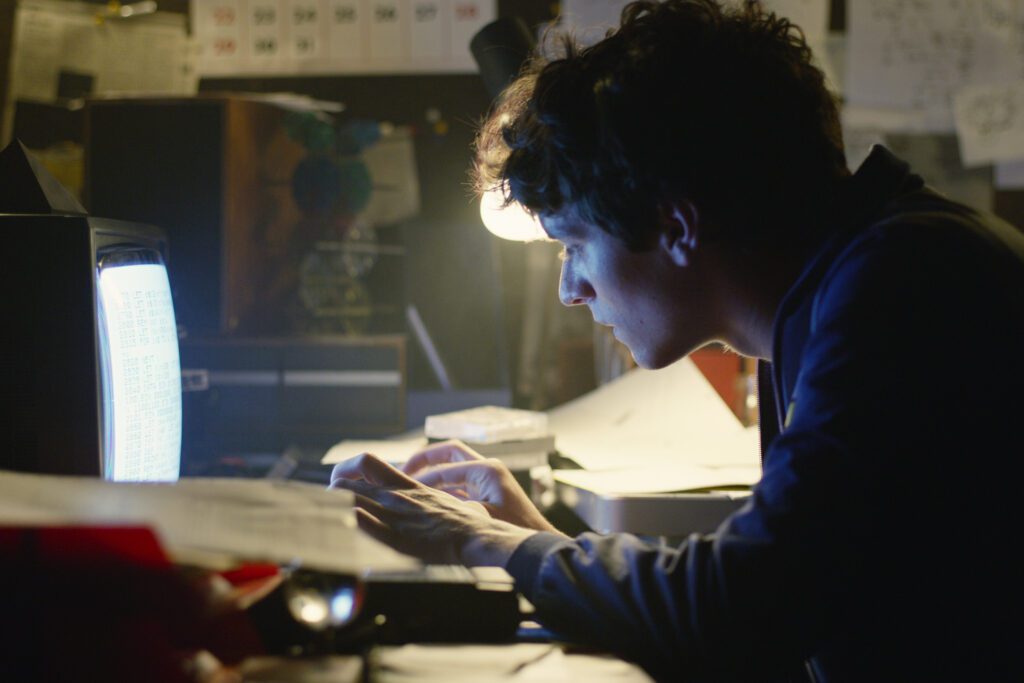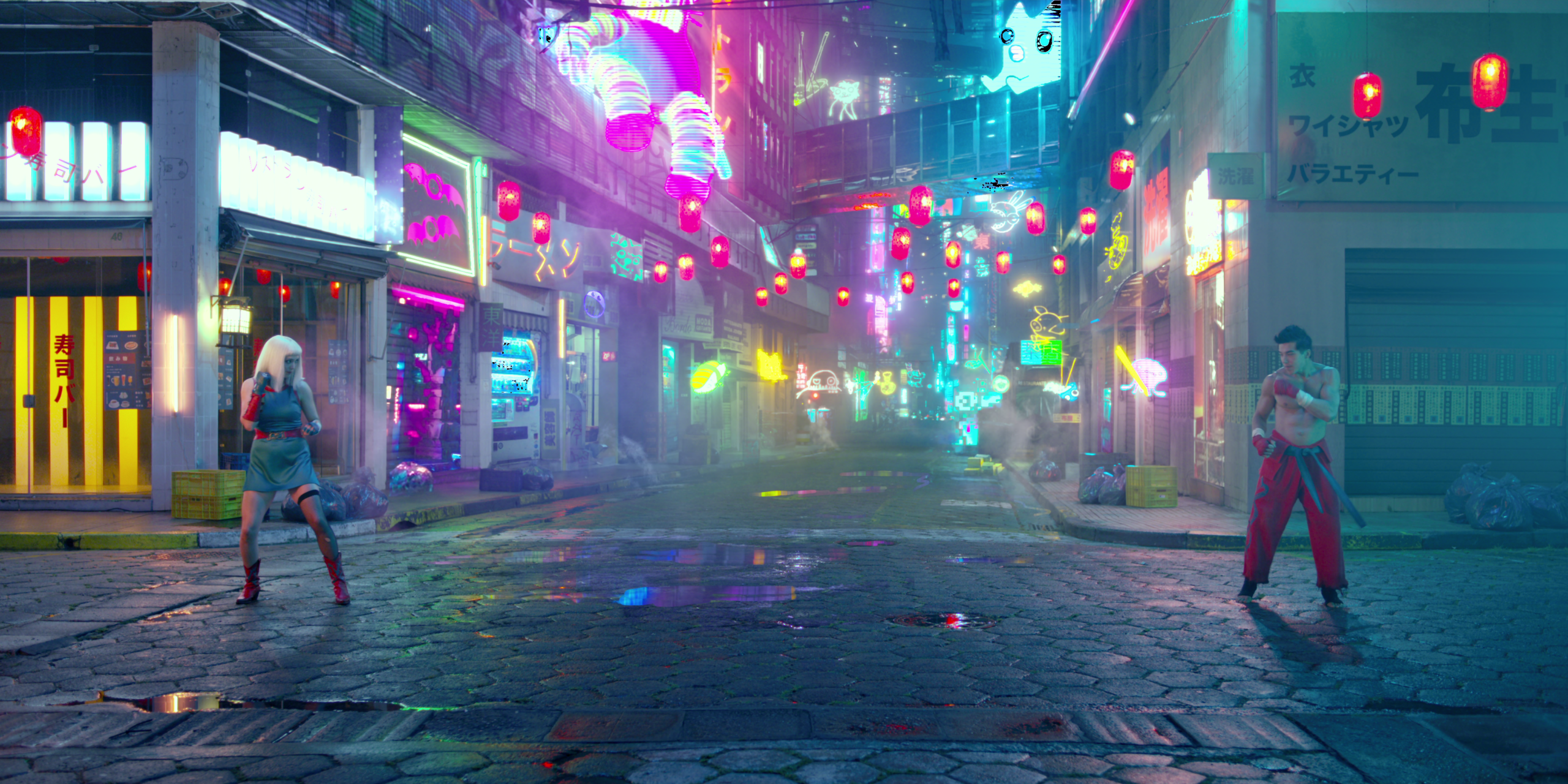Black Mirror has become the poster child for our deepest technological fears which is why so many fans were disappointed with the show’s fifth season which has been described as being “exquisitely dumb” and having “nothing left to say”.
I spoke to showrunners Charlie Brooker and Annabel Jones to find out what their intention was for season five and what we can expect in future seasons.

Season five was very short, but it appears to be questioning how we use technology and the anonymity of the internet to escape, especially in Striking Vipers. Is that what you want the audience to take away from this season?
CB: Firstly, you should know that Bandersnatch was originally part of this season.
When it comes to the show, we don’t tend to think too much about what the viewer will take away because it’s quite ambiguous in Striking Vipers. It’s a bit of a porn analogy rather than dealing with the internet as a whole. It’s a human connection that’s going on there and one that the technology has enabled. They’re engaging in a way that they couldn’t physically do in the real world in the same way. So it’s both sort of an analogy sort of for fantasy fulfillment and at what point a distraction becomes a harmful distraction.
AJ: You’re right about anonymity because it allows them to be free of their sexuality and gender and just to have a connection as Charlie is referring to it. Particularly for Yahya’s character – Carl – for him, it’s quite confusing because in the real world he is a what seems like a heterosexual man yet he goes into this VR environment and suddenly starts exploring a whole other element of his sexuality that he maybe wasn’t totally aware of before.
CB: Or maybe he didn’t even get a chance to explore stuff that isn’t there in the real world in a way. So the role he’s embodying is quite a heady mix.
There’s a lot going on there and it’s a love triangle as well. It’s all to do with communication and how all three of them are not communicating successfully. Hopefully what people take away from it is that it’s quite an interesting story and it’s got kind of uncomfortable moments and sad moments and funny moments.
How do you find ideas for the show?
CB: Really the ideas come about because it’s either a conversation which is: “Here’s a funny thought, what if there was a thing that did this or what if you could…”
The starting point for the stories is looking at what’s an interesting dilemma or what’s an interesting character problem, we focus on that and we come up with a technological explanation for how that could happen. We don’t look at the tech news and go “here’s a new foldable phone” or “here’s a new VR vacuum cleaner” or whatever sort of nonsense is happening, we don’t look at that and then think of a story off the back of it. I guess it’s like a show like The Twilight Zone which uses the supernatural or the uncanny to explore those things but we tend to give it an explanation that has some basis in reality even if what’s happening – as in Striking Vipers – is years away still in terms of technology. Hopefully, that will never stop because human dilemmas don’t seem to be running out soon.
You mentioned The Twilight Zone, how do you differentiate Black Mirror from that?
CB: First of all, I haven’t seen any of the new ones actually yet because I don’t think they’re out in the UK, but the original series was very much a product of its time in many ways, even though it’s one of the few shows that is still shown and watched and admired around the world. I think the similarities are that we’re both stories about ideas that focus on a fairly down to earth individual and then we have bizarre and crazy things happening to them that upend everything they think they know. So that’s the similarity. Where we differentiate is that they would use the supernatural or aliens or they would use the uncanny or the unexplained to make their stories, whereas we always have some sort of technological underpinning. We always give you an explanation for what’s going on, one exception to that rule is Bandersnatch. There the technology is part of the story in a way and it becomes almost a character, you become a character, and there’s lots that we leave unexplained in that story. By and large, that would be the difference I would say. They use magic and we use technology which is our present-day version of magic.
AJ: Twilight Zone tended to be half an hour pieces and we tend to be more an hour piece and I wonder if as a result of that, the difference is maybe our pieces are more character driven and maybe have more of an emotional impact as a result. Although having said that there are some very moving and very emotional Twilight Zone episodes, but I think that their episodes tend to be more twists in the tale and more rug-pulling and more concept driving.
CB: Having said that, we sometimes do episodes like Black Museum and White Christmas, both of those episodes involved sort of three short stories which are closer to the setup of a Twilight Zone story in that you’ve got a sort of “gotcha” twist happening within the stories within those episodes. I’m always a fan of the campfire sort of twist in the tale story.
You can tell the difference in the way that people use the names of the shows actually to describe things, people quite often now – and it’s been very flattering and also terrifying – look at the news often and say “Ooh that’s quite Black Mirror” or look at the unveiling of a new product and go “Ooh that’s quite Black Mirror” whereas people use the Twilight Zone to speak about spooky coincidences or creepy things that are happening so I think therein lies the difference. But ultimately both shows are about human nature.
How do you feel about Black Mirror being seen as foreshadowing our dystopian tech future?
CB: Predicting the future is not our job but we seem to have stumbled across something probably because sometimes we’re just throwing things in as details or as observations, one example being the driverless pizza van in Crocodile. Just days after the episode went out Pizza Hut unveiled one. That’s just really because that sort of thing is bound to happen. If you look at the dogs in Metalhead, we had actually seen videos of the Boston Dynamics dogs before creating the episode. That’s one of the few examples in fact of something providing inspiration for an episode because they were so creepy and unknowable. I remember seeing a sequence where one of them goes around a corner and slips on a slippery floor and it looks pathetic for a moment and it looks sort of a hilarious, like a piece of plastic lawn furniture has fallen over, it just looks ridiculous, and then it slowly gets up and there’s something about the way it does it that looks quite nightmarish and all of that fed directly into Metalhead. In terms of coming up with new ideas, because we’re always focused on the human story, hopefully, that means we won’t run out of new fuel for the engine.
Black Museum confirmed the belief that all the Black Mirror episodes occur in the same universe. Does season 5 take place in the same universe?
CB: In a way, Bandersnatch is kind of an adjunct to season 5. I would say that we’re in a multiverse. There’s Rickman High in Rachel, Jack and Ashley Too, which is Colin Rickman’s name (in Bandersnatch). We probably did slightly dial back on the easter eggs because I think they were getting slightly out of hand. We’re in a sort of notional shared universe. We don’t think about that too much unless it’s helpful from a story point of view.

Bandersnatch was a huge success. What’s next? What type of doors does it open for you?
AJ: It opens multiple doors for us. Sorry, that was a terrible pun.
We were so pleased with the success of Bandersnatch. It was quite a risky project taking on, you’re on a platform that traditionally offers up TV and film and then you have this whole other layer. Some people are watching it as an interactive film and some people are maybe coming to it expecting a game, so it was sort of quite a difficult one to pitch but we just sort of thought “Well, you know, we’re filmmakers – that sounds wanky, I don’t mean that – but you know we make Black Mirror films let’s try and make a Black Mirror film which has another layer of interactivity” but we’d only do that if we feel that it’s not a gimmick and that it actually brings more to the film and brings more to your emotional engagement with the film. Charlie found the perfect premise to do that, you know it was hard but it was great fun and if we find another idea that could actually only be enhanced by having interactivity then we’ll absolutely do it.
CB: If Netflix comes up with a button for left, a button for right and a button for jump, then I’d love to do a Black Mirror platform game.
How do you go about casting for Black Mirror?
AJ: It’s interesting in that all of the Black Mirror episodes are very different and there are some actors who have more of an interest in some episodes or ideas or worlds than others. I suppose we’re just very lucky when you find an actor who really cares or is interested in the story we’re trying to tell. Whether that’s Anthony Mackie, who is such a talented actor and has such a range but most people have probably seen him playing quite alpha male roles, so for him taking this role shows off his huge talent. It’s brave for him and it’s surprising for his viewers to see him as a sort of middle-aged, slightly more domesticated guy living in the periphery of a town and being quite bored and slightly lost and lonely. So for him that’s a really interesting world for him to occupy.
All actors will tell you that they want to take on other challenges and they need to take on other roles and so it’s just that perfect timing where Anthony just really engaged with it and we wanted him to do it. We also have a wonderful casting director called Jina Jay who is so well respected in the industry and is such good friends with so many actors and knows what pieces they’re looking for, that she helps sort of facilitate it all and she’s just got impeccable taste. So we’re just very lucky as a result of all of those things really.

An example of that is Andrew Scott’s fantastic performance in Smithereens.
CB: Thank you. He’s a brilliant actor. He’s also a very nice man. I should hate him for that.
AJ: Maybe that wrongfoots people a little bit as well (Andrew Scott is most well known for his role as Moriarty in Sherlock), I don’t know. We did a table read – before you start filming you do a table read with all of the actors just to bring everyone together and to sort of set the mood for the film – and he came to the table read and I think everyone there was absolutely gobsmacked by how compelling he is. He’s just such a skilled actor that even in his quietest moments he’s giving so much, just it’s very hard to not watch him I think.
The premise of Smithereens is very relevant because it’s talking about the impact of technology and social media on life right now.
CB: In the episode, the Billy Bower character, he’s not quite a villain, you know it’s not like the company is evil, they didn’t start out trying to be, it’s like everyone’s found themselves in an awkward and compromised position really in that story. It’s not offering any easy solutions to anything because that’s not our job.
In regards to how you approach your content and your stories, there’s a very strong level of alienation that is to be had with it. There are times when the show tells the audience “you suck” and that the world is bleak and technology is out to get you and all that. Given that we are now 5 seasons in it shows that there is a definite desire for this type of storytelling and there’s a very positive reaction to it. Living in the plot of 15 Million Merits, does this positive response indicate any problem that you think there is with media today or is Black Mirror just answering a call for content that is just wanted.
CB: I slightly dispute whether it’s telling people that they suck or that technology is evil because I don’t think that it does. I think that sometimes we do incredibly cynical stories and sometimes we do much more optimistic and warm-hearted stories. The idea is that we just want to always be surprising and provocative but hopefully not in an empty or shrill way. In terms of why it seems to resonate with people, I don’t know hopefully that’s because they’re pretty universal stories. They’re centering on flawed human beings – which we all are – and it’s come along at a time when it’s examining technological miracles in many ways and we’re surrounded by those on a daily basis. I think that it’s an unsettling time to live through because there’s a great deal of technological change but it’s also an exciting period to live through. I think that fuels our curiosity and there’s a hunger for people to see those kinds of thoughts and their worries and their feelings about it expressed in dramatic terms. Certainly when we started we were probably one of the few shows that were doing that so we kind of came along at the right time. I guess also, generally speaking, you get the entertainment – and era gets the entertainment – that it sort of deserves in a way. So in the 70s you had a lot of paranoid conspiracy thrillers and quite cynical things about politics and the government in the wake of the Nixon administration and the Kennedy assassination, you had ripples of that fed through in entertainment; in Britain in the 80s you had huge reactions to Thatcherism and the Cold War was also a huge influence on entertainment. In worrying times people seem to like horror films and things like that and escapism, so I think that rather than it necessarily being a problem I guess we’re sort of benefitting from that.


